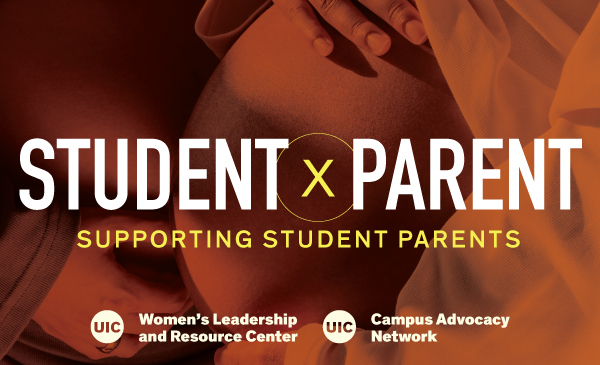Supporting Pregnant and Parenting Students
What does it mean to be a pregnant or parenting university student in Illinois? Heading link
What are the social, economic, and learning conditions that shape the experiences of these students?
What do educational institutions need to do differently to become supportive spaces where pregnant and parenting students can expect to thrive?
These are only some of the questions that advocates and researchers have asked to try to identify solutions to the many issues that parenting students experience on their educational journey.
UIC’s Women’s Leadership and Resource Center has decided that, not only did we want to learn about the answers that others came up with, we also wanted to share that information with you.
Why?
Because student parents at UIC are, like at so many other institutions, a silent and invisible population. Silent because they may not believe they will be listened to. Invisible because the university hardly acknowledges them. National estimates say that one in five college students is a parent. We need to hear their voices and take seriously what they have to say.
Because when we understand the larger societal context (racial, gender, and economic inequities) and institutional contexts (urban public university with a majority of students from historically marginalized communities) in which parenting students are doing academic studies, we can think more clearly and concretely about what needs to be done to help them, and who should be involved in making the necessary changes.
Because, as a university community, we generally believe that research and knowledge production are not only important but must also be put to use in order to be meaningful. This brief and resource guide is the first step towards putting this knowledge into practice.
We urge you to read, reflect, and to join with us in helping to make UIC a place where pregnant and parenting students feel welcome, experience support and belonging, and can realize their full academic potential. We welcome your feedback at wlrc@uic.edu.
Pregnant and Parenting Students: A Policy Brief Heading link
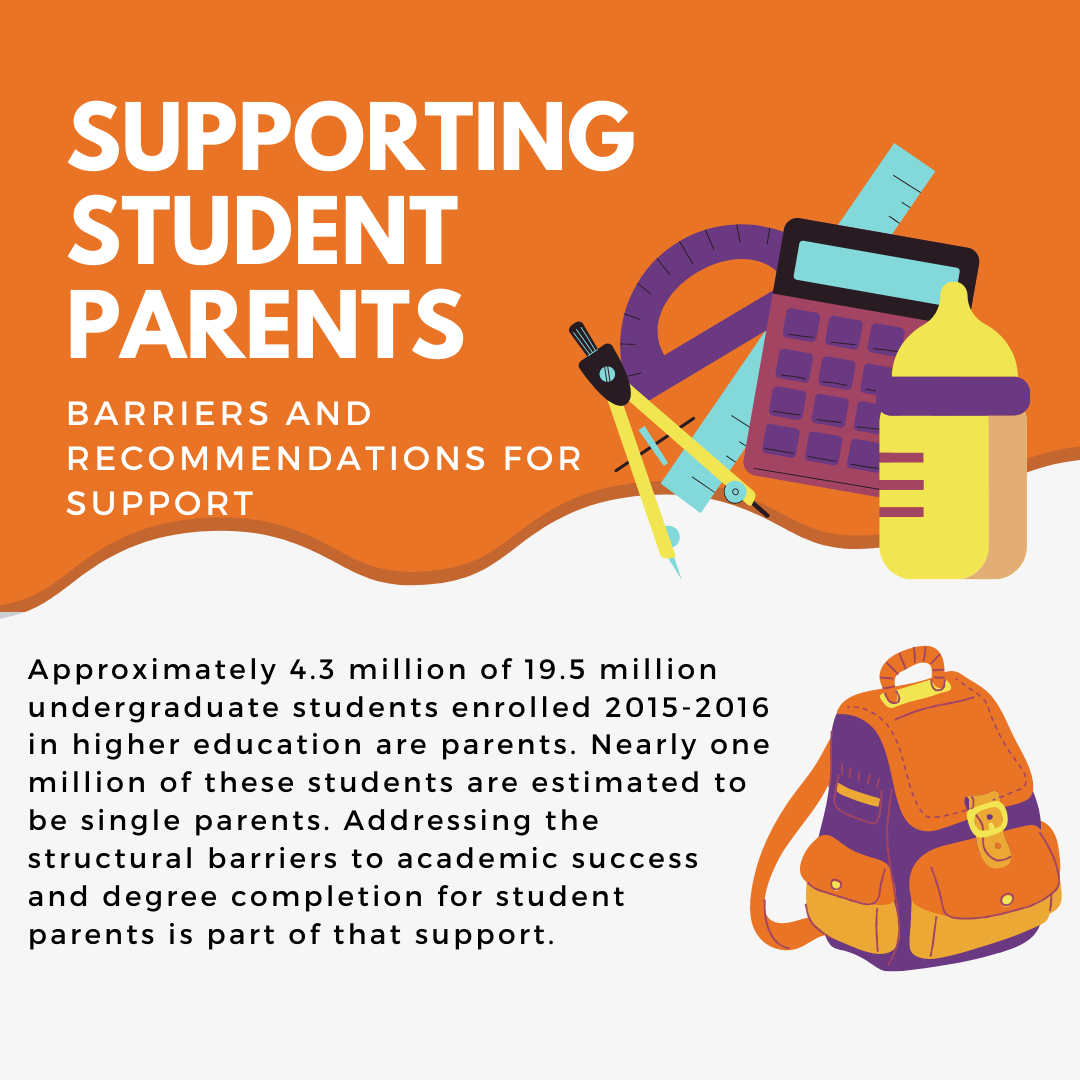
Based on data from the U.S. Department of Education, approximately 4.3 million of 19.5 million undergraduate students enrolled 2015-2016 in higher education are parents. Nearly one million of these students are estimated to be single parents. The campus’s recognition and support of student parents fosters their path towards degree attainment. Addressing the structural barriers to academic success and degree completion for student parents is part of that support. In a study conducted by the Jed Foundation, scholars of all family structures reported heightened stress levels and a sense of being overwhelmed, yet student parents were more likely to also have greater financial strains and lack of time availability for household management1.
Social determinants of health are the conditions in the environments where people are born, live, learn, work, play, worship, and age that affect a wide range of health, functioning, and quality-of-life outcomes and risks 2. While the types of needs among parenting students vary, affordable childcare, food security, and mental healthcare are frequently highlighted by surveyed students and in peer-reviewed articles 3.
This policy brief seeks to 1) Bring awareness to social determinants of health that disproportionately affect student parents in Illinois; 2) offer recommendations to university administration for increasing support of student parents on campus; and 3) increase the university community’s awareness of and engagement with parenting scholars and their needs.
In 2019, 54.7% of students enrolled in postsecondary schools in the U.S. are women and 45.7% of degree-seeking students are non-white 4–5. In Illinois, an estimated 22 percent of all undergraduates, or 145,882 students, are parents 6. Challenges facing student parents are compounded by inequities such as race, ethnicity, class, and/or gender. An estimated eight percent of single mothers earn a degree within six years of enrollment, compared to forty-nine percent of non-parenting 7. Research shows that Asian, Black, and Latinx parenting students face higher rates of basic needs insecurity (food and housing access) than peer parenting students 8.
Learn more Heading link
Leave of Absence and Paid Time Off
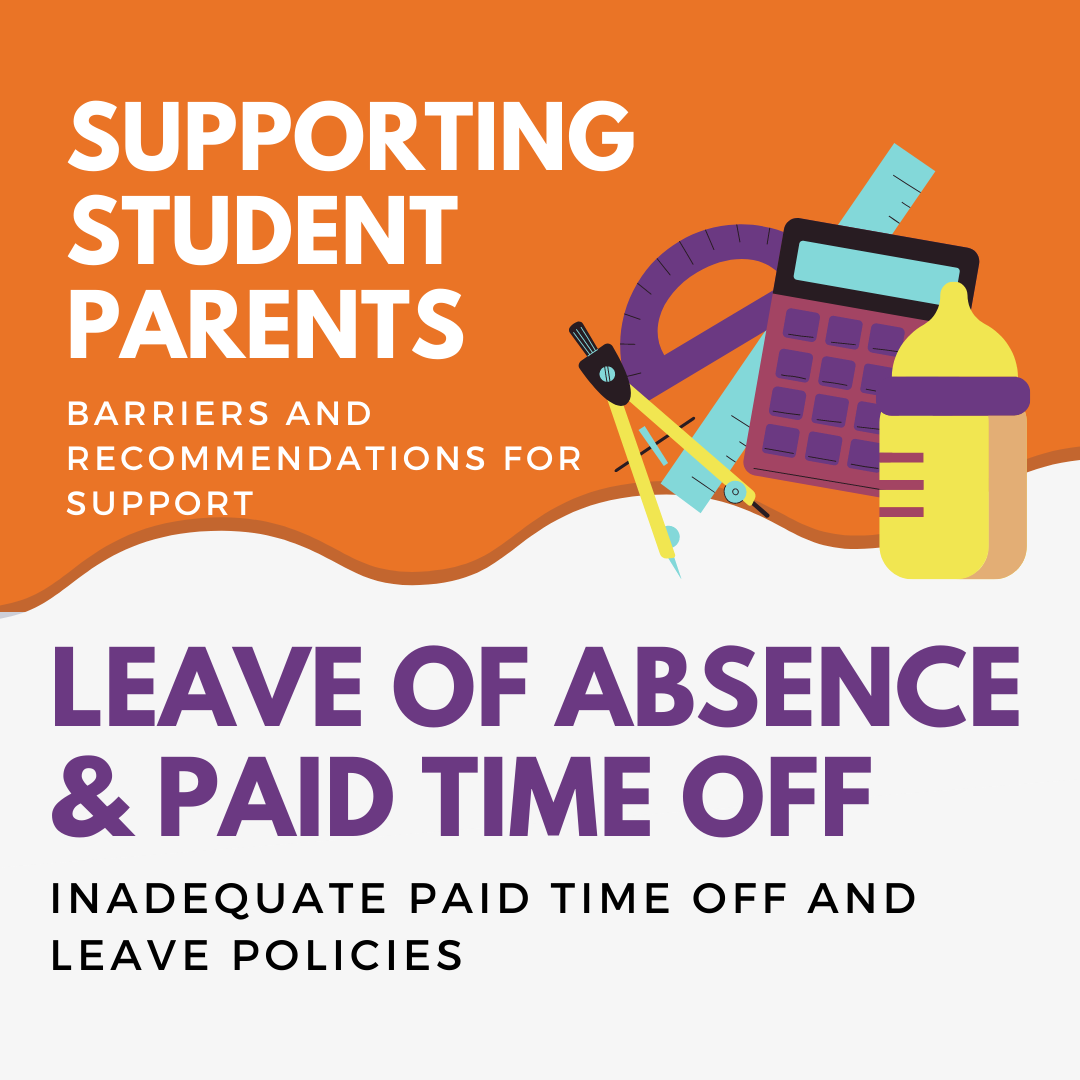
Title IX of the Education Amendments of 1972 (Title IX) prohibits discrimination based on sex and work, which extends to pregnant and parenting students at public and private institutions. Title IX provides pregnant students with access to the same accommodations as others with temporary medical conditions, allows excused absence for medical visits, and protects from harassment based on sex.
There is no national standard for paid leave for employees in the United States. The University of Illinois System grants up to six weeks of paid parental leave to employees that have completed six months employment and are 1) academic staff members; or 2) civil service employees in a trainee, apprentice, learner, or status appointment or in a provisional appointment intended to be permanent 9. For UIC students who hold graduate teaching or assistantship appointment(s), six weeks of parental leave without loss of pay 10. For parenting students not within these categories, lack of paid time off and leave impacts health as well as academic success.
Food and Housing Insecurity
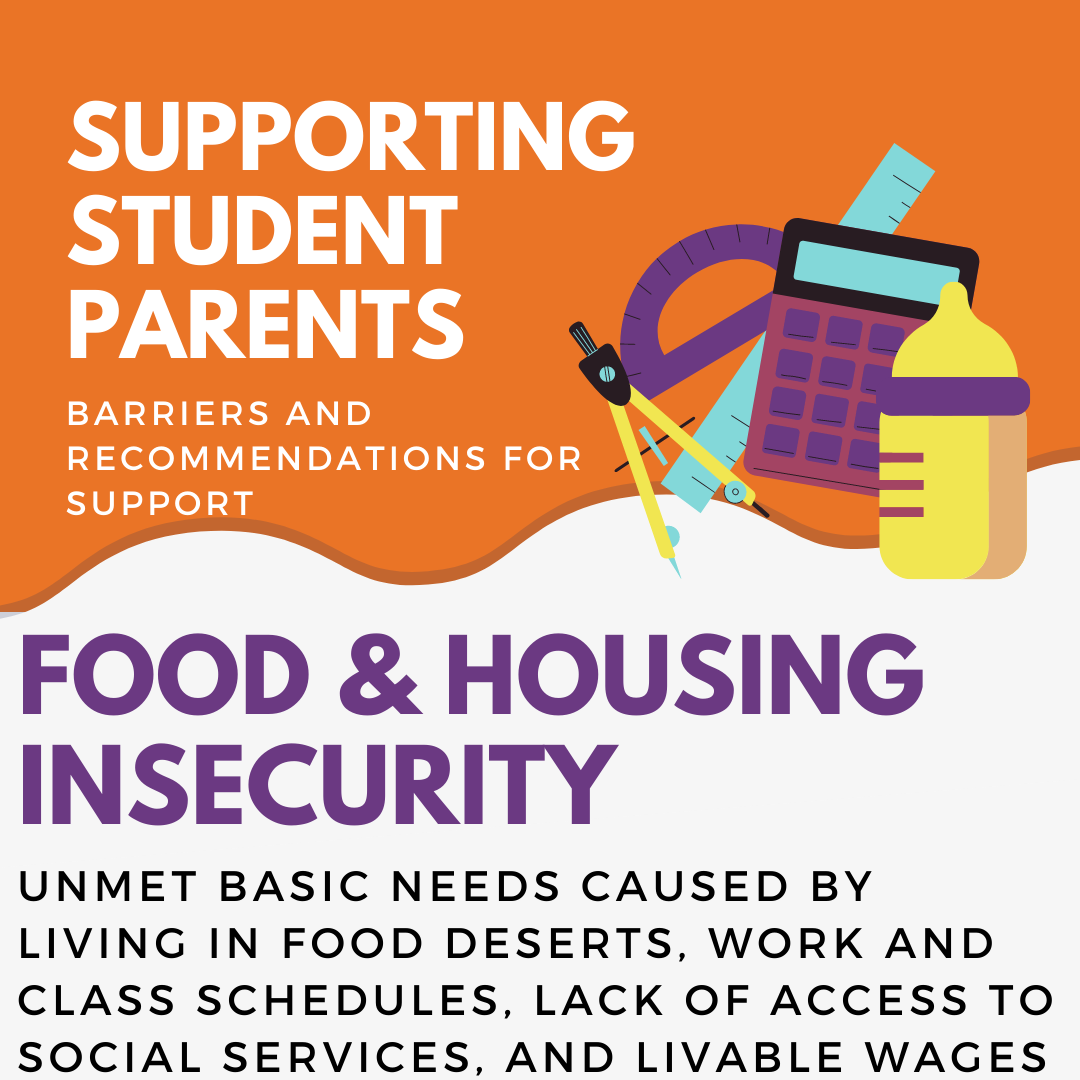
According to the 2019 #RealCollege survey , fifty-three percent of parenting students dealt with food insecurity, defined as “the limited or uncertain availability of nutritionally adequate and safe food, or the ability to acquire such food in a socially acceptable manner”. The survey defines housing insecurity as a “broad set of housing challenges that prevent someone from having a safe, affordable, and consistent place to live.” Sixty-eight percent of parenting students reported housing insecurity and seventeen percent reported their housing status as (without a fixed, regular, and adequate place to live) 11.
While they address individual need , campus food pantries do not solve the underlying social determinants related to food insecurity. Student parents’ basic needs are unmet due to residing in food deserts, work and class schedules, accessibility of safe neighborhoods, and livable wages, with adjustment for inflation. From one 2017 multi-method study, surveyed student respondents reported “experiencing shame and stigma in accessing (food pantry) services.” 12. Pantries also have limited supply of high demand infant items, such as diapers and sanitation wipes. While student parents may qualify for Supplemental Nutrition Assistance Program (SNAP) & Women, Infants and Children (WIC), only Temporary Assistance for Needy Families (TANF) provides cash assistance for diapers. Student parents must draw on Diaper Banks to supplement what benefits will not cover 13.
Due to COVID-19, many universities provided temporary assistance to students through the CARES Act Higher Education Emergency Relief Fund (HEERF) 14. This emergency funding helped students to cover education gap expenses, such as food, housing, and tuition assistance. With many of these emergency funds ending in 2022, student parents may find themselves facing the previous strain on finances.
Lactation Space
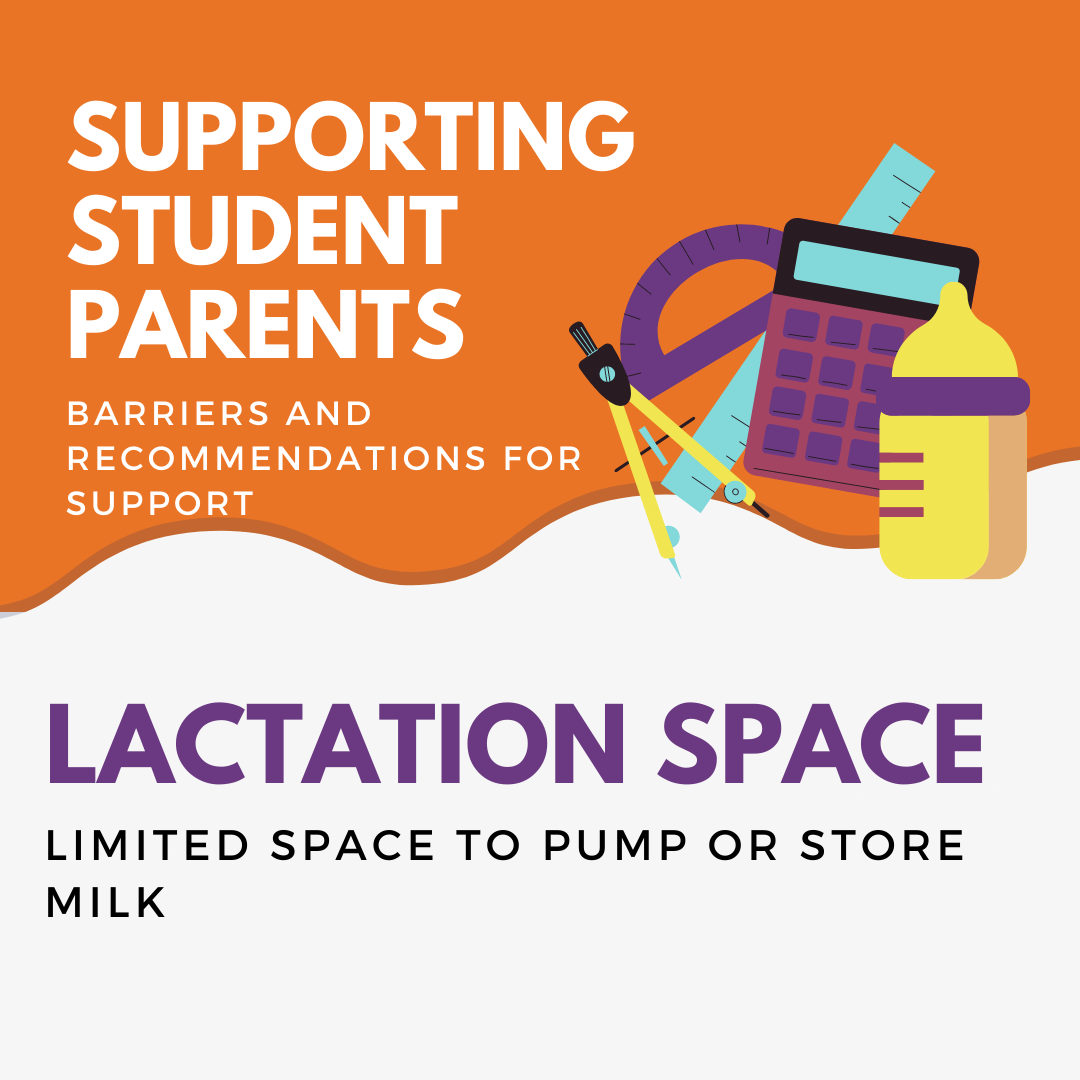
One 2016 study found that 55% of postsecondary institutions sampled had a dedicated space for nursing students 15. While lactation spaces previously existed in some workforce spaces, the adoption of the Patient Protection and the Affordable Care Act (ACA) amended Section 4207 of the Fair Labor Standards Act to require companies with more than fifty employees to provide private nursing spaces that are not 16 . For student parents without dedicated lactation space, they endure prolonged periods without safe pumping, utilize non-designated makeshift spaces or go without proper equipment and storage methods for pumped milk.
Childcare
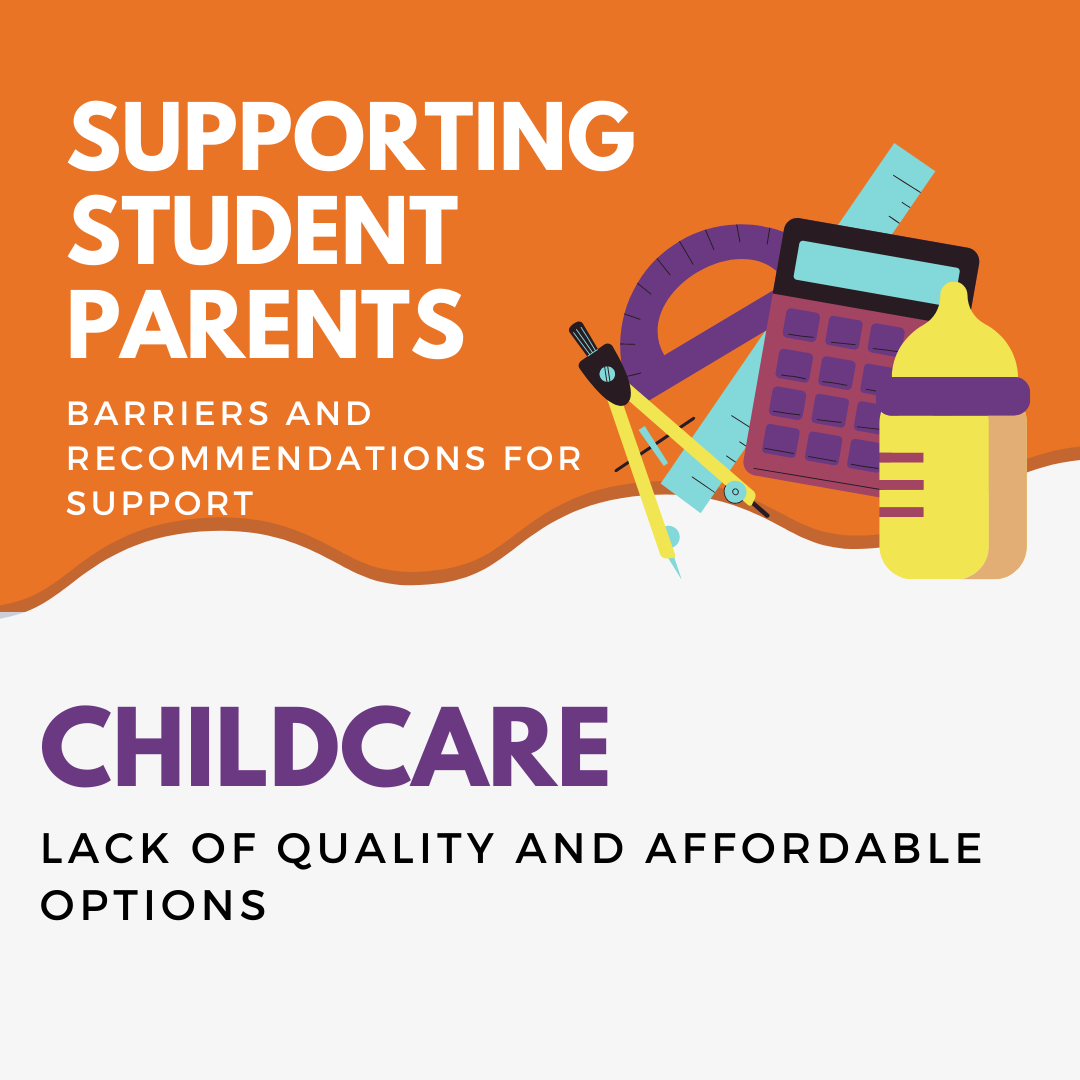
In Illinois, 68 percent of all public higher education institutions—including 10 four-year and 31 two-year schools—had a campus childcare center in 20176. However, long waiting lists and costs remain deterrents to this highly coveted service. As we enter year three of the global COVID-19 crisis, shelter-in-place recommendations, remote learning, and childcare needs continue to impact student parents’ capacity to navigate home and educational requirements. Lack of quality and affordable childcare options remains a major barrier for student parents. Students may turn to family and friends to provide childcare, especially in the case of graduate and doctoral students, who often have non-traditional work schedules outside typical childcare service hours of operation.
The current structure of academic settings does not include optimal spaces for student parents to bring young children alongside 17.
Student Status
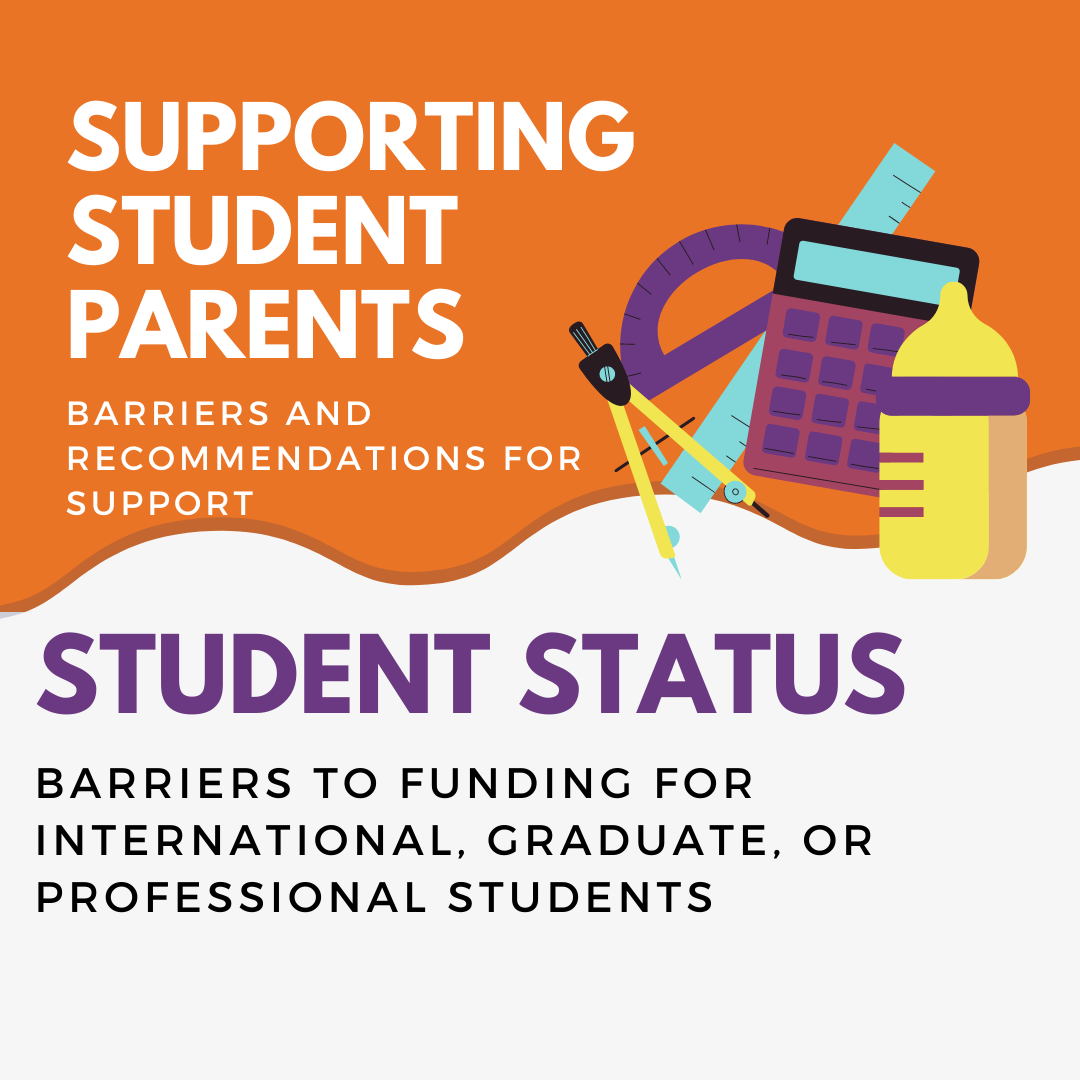
Because discussions about student parents tend to focus on undergraduate students, international, graduate, and professional students are often excluded from surveys of student parent needs despite accounting for significant amounts of parenting students. Residency status affects international student access to federal financial aid, such as Pell Grant, subsidized loans, and work-study programs. Graduate and professional students may not qualify for federal funds, such as Pell Grants, and may be offered loans at higher interest rates than undergraduate students 18.
Recommendations
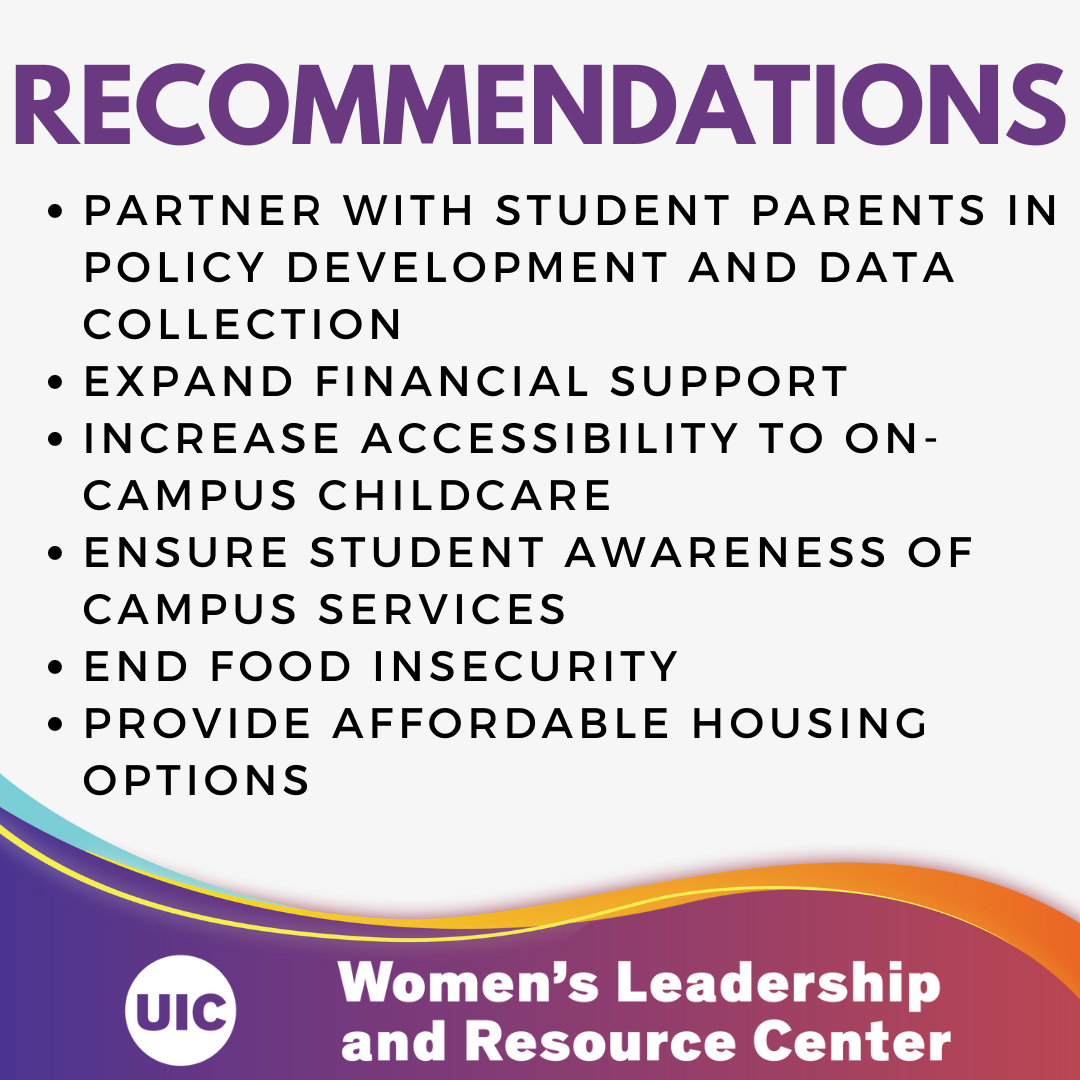
Higher education institutions should continue to collect robust data on student parents and implement policies to support the needs of students with children in their academic and training programs. The formalization of legislation, such as IL SB0267, allows public colleges and universities to better understand student parents and how to best support them. Public institutions are now required to keep a record of the parenting status of all enrolled students. If a university operates a childcare center, the number of children of students is collected as well. Incorporating the voices of student parents through assessments such as entrance surveys, periodic benchmarks, and prior to program completion ensures that the unique needs of parenting scholars are quantified, tracked, and addressed. Tools such as the Campus Family Friendly Toolkit can advance efforts to make a university campus more accessible to students with families.
Increased accessibility to on-campus childcare services may take the form of non-traditional operation hours and/or flexibility with bringing children to class. Ensuring that students are aware of campus services, such as lactation rooms, contributes to the reduction of stigma around nursing on campus. Over the past years, more universities have also modified academic spaces, such as libraries, to offer family-friendly study spaces to allow parents and their child(ren) environments that support study needs as well as stimulation needs for children.
Reducing food insecurity among students includes increasing access to nutritious, affordable options for residential and commuter students. Committing to student worker wages that are responsive to inflation and rising costs of living allows parenting and pregnant students greater income stability. Campus housing should include options for student parents in close proximity to childcare services.
Academic institutions may consider the incorporation of navigators, similar to those in healthcare insurance settings, who can assist student parents with understanding and enrolling in social services, such as SNAP, WIC, TANF, and Medicare, while sharing affordable housing and childcare services.
Inclusive language around parenting programs and services can increase comfort for parenting students with identities beyond the gender binary. Print materials, policy, and conversation should recognize nonbinary and transgender parenting students and address their needs for accommodations on campus and beyond.
References
- Jed Foundation. 2021. Improving Mental Health of Student Parents: A Framework for Higher Education. Ascend at the Aspen Institute. https://ascend.aspeninstitute.org/wp-content/uploads/2021/05/MentalHealthFramework_Final.pdf
- HSS. 2022. Social Determinants of Health. Healthy People 2030. https://health.gov/healthypeople/objectives-and-data/social-determinants-health
- United States Government Accountability Office. 2016. More Information Could Help Student Parents Access Additional Federal Student Aid. United States Government Accountability Office. https://www.gao.gov/assets/gao-19-522.pdf
- National Center for Education Statistics. 2022.. Total fall enrollment in degree-granting postsecondary institutions, by level of enrollment, sex, attendance status, and race/ethnicity or nonresident alien status of student: Selected years, 1976 through 2019. https://nces.ed.gov/programs/digest/d20/tables/dt20_306.10.asp
- National Center for Education Statistics. 2022. Total fall enrollment in degree-granting postsecondary institutions, by state or jurisdiction: Selected years, 1970 through 2019. https://nces.ed.gov/programs/digest/d20/tables/dt20_304.10.asp
- IWPR. 2020.Investing in Single Mothers’ Higher Education in Illinois: Costs and Benefits to Individuals, Families, and Society. Center In Equity in Higher Education. https://iwpr.org/wp-content/uploads/2020/08/Illinois.pdf
- IWPR. 2019. Investing in Single Mothers’ Higher Education. Institute for Women’s Policy Research. https://iwpr.org/iwpr-issues/student-parent-success-initiative/investing-in-single-mothers-higher-education-state/
- Kienzl, G., Hu, P., Caccavella, A., & Goldrick-Rab, S. 2022. Parenting while in college: Racial disparities in basic needs insecurity during the pandemic. The Hope Center for College, Community, and Justice. https://hope4college.com/wp-content/uploads/2022/02/parenting_students_brief.pdf
- University of Illinois System Human Resource Services. 2022. Pregnancy Leave. University of Illinois System. https://www.hr.uillinois.edu/cms/One.aspx?portalId=4292&pageId=5646#eligibility
- GEO Local 6297 (IFT-AFT). 2019. Graduate Employees Organization Labor Agreement. University of Illinois at Chicago. https://uofi.app.box.com/s/gyscndjeq71l8bvyij27o1sldcdihvu1
- The Hope Center for College, Community, and Justice. 2020. Parenting While in College: Basic Needs Insecurity Among Students with Children. The Hope Center. https://hope4college.com/wp-content/uploads/2020/05/2019_ParentingStudentsReport.pdf
- Hattangadi, Vogel, E., Carroll, L., & Côté, P. 2019. “Everybody I Know Is Always Hungry…But Nobody Asks Why”: University Students, Food Insecurity and Mental Health. Sustainability (Basel, Switzerland), 11(6), 1571–. https://doi.org/10.3390/su11061571
- National Diaper Bank Network. 2022. Federal Issues. https://nationaldiaperbanknetwork.org/federal-issues/
- Office of Postsecondary Education. 2021. CARES Act: Higher Education Emergency Relief Fund. US Department of Education. https://www2.ed.gov/about/offices/list/ope/caresact.html
- Bostick, M. W., Albrecht, S. A., Baghdadi, N., Haley, C., & Spatz, D. L. 2016. Do American Colleges and Universities Support the Lactation Needs of Students? Breastfeeding medicine: the official journal of the Academy of Breastfeeding Medicine, 11, 376–379. https://doi-org.proxy.cc.uic.edu/10.1089/bfm.2016.0022
- U.S. Breastfeeding Committee. N.d. What are the space requirements? http://www.usbreastfeeding.org/p/cm/ld/fid=238
- Scott, R., & Varner, B. (2020). Exploring the Research and Library Needs of Student-Parents. College & Research Libraries, 81(4), 598. doi:https://doi.org/10.5860/crl.81.4.598
- Federal Student Aid. 2017. Financial Aid for Graduate or Professional Students. US Department of Education. https://studentaid.gov/sites/default/files/graduate-professional-funding-info.pdf
March 20, 2025 Symposium Heading link
From Surviving to Thriving: Cultivating Possibilities for Parenting Students in Illinois
On March 20, 2025, UIC’s Women’s Leadership and Resource Center (WLRC), in collaboration with campus partners (Little Sparks program, Center for Excellence in Maternal and Child Health, Office of Student Success and Belonging, African American Academic Network, Office of Access and Equity, and Life Scholars program) will host a symposium intended to explore the unique needs and challenges of parenting students by uplifting student stories, presenting current research on parenting students, identifying best practices for supporting pregnant and parenting students, and articulating ways to collaborate to put our ideas into action at UIC and campuses statewide.
We invite and encourage parenting students, staff, and faculty from UIC and other universities in Illinois to participate in this discussion about how to ensure parenting students can thrive on our campuses.
More Info About the Symposium
March 2023 Events Heading link
Fill Out Our Survey Heading link
What do you need as a pregnant or parenting student? We invite you to to tell us through this brief anonymous survey so we can share the info with UIC administration, staff, and faculty. Please share your feedback!
Resources Heading link
Below, find our compiled list of resources to support UIC pregnant and parenting students around greater Chicago and beyond. If you would like to suggest additional resources, please email us.
Child Services and Reproductive Health
Generation Hope – Pregnant Girl, by Nicole Lynn Lewis
Along with her own story as a young Black mother, Nicole Lynn Lewis weaves in those of the men and women she’s worked with to share a new perspective on how poverty, classism, and systemic racism impact teen pregnancy and on how effective programs and equitable policies can help teen parents earn college degrees, have increased opportunity, and create a legacy of educational and career achievements in their families.
The mission of the Chicago Abortion Fund is to advance reproductive autonomy and justice for everyone by providing financial, logistical, and emotional support to people seeking abortion services and by building collective power and fostering partnerships for political and cultural change. We envision a world where everyone has the freedom and autonomy to create lives, families, and communities that are healthy, safe, and thriving and where the full range of reproductive choices, including abortion, are accessible and affirmed.
At the heart of Chicago Birthworks Collective is their passion to empower Black families through an amazing pregnancy journey. Their collective of trained doulas and birth workers offer support and education through excellent care and luxury services. Whether it’s your first child or your fifth, they are here to help you navigate the healthcare system, teach you how to advocate for your rights, and curate a birth experience that celebrates your growing family.
A Chicago Volunteer Doula is a labor support professional who has chosen to commit time and energy to helping pregnant people and their families in Chicago. Our doulas come from a variety of backgrounds. They are social workers, childcare workers, cab drivers, accountants, stay-at-home moms, midwifery students, artists, activists, nurses, lawyers, teachers, yoga instructors, and massage therapists. Their doulas celebrate different cultural backgrounds, and some are fluent in Spanish.
CWHC facilitates the empowerment of women, trans people, and young people by providing access to health care and health education in a respectful environment where people pay what they can afford.
IL Child Care Assistance Program (CCAP)
The Illinois Department of Human Services’ (IDHS) Child Care Assistance Program (CCAP) and your local Child Care Resource and Referral (CCR&R) agency are working together to support families to get the information and resources the need to find and select the best child care for their child.
Head Start programs deliver services to children age birth to 5 and their families in core areas of early learning, health, and family well-being. The Head Start program serves about 1 million children and pregnant women in urban, suburban, and rural communities throughout America. Head Start services are provided in centers, family child care homes, or in the family’s own home.. Find local, high-quality early childhood education services in the Chicagoland area
Melanated Midwives mission is to diversify the midwifery profession and empower Black birth parents with resources and tools to successfully navigate their prenatal and postpartum care. Melanated Midwives is actively engaged in addressing the maternity health care desert and Black Maternal mortality and morbidity rates on the Southside of Chicago by bringing together Black mothers, pregnant people, politicians, public health workers and community activists.
For young parents, parenthood isn’t the end of the road. It’s essential that pregnant and parenting students not only have equal access to education, but also receive support to help them succeed in school.
Planned Parenthood delivers vital reproductive health care, sex education, and information to millions of people worldwide.
The Aspen Institute’s “1 in 5” podcast vividly profiles students who are parents pursuing their education while raising a family and working.
Our Mission: Helping individuals navigate and overcome the challenges of separation and divorce by providing access to legal information, support networks and professional resources. Our Vision: All people can confidently navigate the process of family breakdown, separation and divorce.
The UIC Children’s Center provides high quality early childhood education and childcare to preschool aged children of current UIC students, faculty, and staff in an on campus location.
Additionally, the Children’s Center provides opportunities for classroom experiences for University students in early childhood education and other related professions that support young children and their families.
Chicagoland WIC Grocery Program
WIC Grocery is Chicagoland’s one stop shop for healthy and nutritious WIC-approved goods. Recently redesigned, each of WIC Grocery’s 16 locations offers a wide variety of name-brand, nutritious and 100% WIC-approved foods. Starting in 2020, all WIC Grocery locations began accepting the Illinois WIC EBT card to ensure easy and convenient benefit redemption. All WIC Grocery locations are operated by Catholic Charities of the Archdiocese of Chicago.
Financial Aid
Change in Financial Situation Appeal Process
If a student, their parent, or their spouse (if married), experiences a change in their finances, the financial aid may be recalculated through a process called Change of Financial Situation Appeal.
Emergency funding at UIC – Dean of Students Page
The U and I Care Fund provides temporary, short-term financial assistance to currently enrolled students who are unable to meet essential expenses due to a temporary or unexpected hardship. This emergency funding program is designed to offer financial assistance to students in the form of one-time awards (typically not exceeding $1000). Emergency funding is NOT intended to provide ongoing relief for recurring expenses. Decisions regarding disbursement of funds are made on a case-by-case basis.
Graduate students who experience an acute and unexpected short-term hardship may to apply for an emergency grant. Acute and unexpected hardships may include burial costs, fire damage, or auto repairs due to accident. This program is being administered by the Graduate College in accordance with applicable University rules and policies. Funding for the Emergency Grant program comes from the Student-to-Student fee that is assessed to graduate students in Fall and Spring Semesters.
The Office of Scholarships assists current UIC undergraduate and professional school students with understanding and navigating the campus scholarship process and external opportunities. We do not award scholarships, and our services are available to current UIC undergraduates and professional students only.
Scholarships For Your Non-Traditional Situation
Many any non-traditional, or returning, students can feel left out of the scholarship equation. However, there are many scholarships and grants dedicated to helping the non-traditional student achieve his or her educational goals. These scholarships are funded by a variety of sources, including corporations, professional associations and colleges and universities. Non-traditional students, and returning students looking to finish an interrupted education, can find many lucrative scholarship opportunities specifically designed for their situation.
It is our mission to get rid of the stigma of divorce so people can make a real decision for their family’s future that does not come from a place of guilt and shame. The Atlanta Divorce Law Group is proud to hold The Divorce Stigma Scholarship, for another year, to hear students share their experience with divorce and how it differed from the negative stigma that surrounds divorce today.
Housing, Benefits and Legal
As the Commuter and Off-Campus Life (COCL) team, we strive to provide a sense of belonging among commuter and off-campus students while offering programs and services to enhance wellness, academic success, and student engagement at UIC. We work to educate our campus on understanding the commuter student experience and how to best support the 85% of UIC of off-campus students who travel to campus daily. Whether you commute from home or live in an off-campus apartment –we are here to assist you.
Illinois Legal Aid Online – Child Guardianship
Usually, only a parent of a child has the authority to make decisions about the care of a child. Sometimes, a parent cannot or will not make care decisions for their child. Legal guardianship lets someone that is not a parent make care decisions for a child, just as a parent would.
Illinois Housing Development Authority
This site is intended to help guide Illinoisans in need of emergency housing assistance due to financial hardship caused by the COVID-19 pandemic. Discover the emergency assistance programs available to you by multiple state agencies including: the Illinois Housing Development Authority (IHDA), the Illinois Department of Human Services (IDHS) and the Department of Commerce and Economic Opportunity (DCEO).
Illinois Legal Aid Online – Navigating food assistance programs
You can use the Supplemental Nutrition Assistance Program (SNAP) benefits to buy food. The money comes from the federal government, but it is run by the Illinois Department of Human Services Every month, your SNAP benefits are automatically put on a LINK card. Your LINK card can be used to buy food at approved locations. There are different rules if there is an elderly or disabled member of your household.
Illinois Legal Aid Online – Breastfeeding: What are my rights?
Provides information on breastfeeding rights, including workplace, school, courts, and other expenses.
Illinois Legal Aid Online – Parental Responsibilities
The term “custody” is no longer used in the law. It is now called “parental responsibilities.” This includes parenting time (formerly “visitation”) and decision-making power. Their resources explain these issues
Insurance Reimbursement for Lactation Expenses.
Website includes information about student lactation rights and spaces in Chicago
SNAP/TANF/Insurance Pre-Screening tool
SNAP gives a monthly dollar amount on a preloaded Electronic Benefits Transfer (EBT) card to buy food for you or your family. A predetermined amount will be loaded onto your EBT card based on your household income. Learn more about EBT cards on the U.S. Department of Agriculture’s (USDA) website.
The Greater Chicago Food Depository
Provides resources for mobile and local food pantries, as well as supplementing children and school-based programming. They also offer job training for under and unemployed adults.
Offers services for pregnant/parenting people ages 14-21. Their program includes Response-Ability Pregnant and Parenting Program (RAPPP)
Student Legal Services (SLS) is available to assist current UIC students in understanding and solving their legal problems. SLS can provide confidential legal advice, counsel and limited representation for currently enrolled students.
UIC Modified Teaching Duties for Faculty Members with Life-Changing Events
The purpose of this policy is to address the situation involved when a faculty member is responsible for semester-long teaching responsibilities and at the same time encounters any of the following events: 1) a new child enters the home; 2) a spouse/partner, child, sibling, or parent is diagnosed as having a terminal illness and requires intensive life-saving treatment or is in the end stages of the illness; 3) death of a spouse/partner, child, sibling, or parent. This policy enables the primary caregiver (or co-equal primary caregivers) to spend more time with the relevant family member(s). This policy reflects UIC commitment to creating a family/life -friendly work environment.
UIC Office for Access and Equity – Title IX Services
The Office for Access and Equity (OAE), strives to increase access to employment, programs, and services in an environment free of unlawful discrimination and harassment.
UIC Parking resources for third trimester pregnant persons
UIC Parking Services has developed a new program which provides convenient parking spaces for expectant mothers. This Program applies to any UIC faculty, staff member, or student who is in the third trimester of her pregnancy. The UIC faculty, staff member, or student must already have a parking permit from Parking Services.
Resources on campus, including food pantry, lactation spaces, child services, discounted programs, student parent rights
WIC does not provide a dollar amount to buy food items. Through WIC, you can get nutrition education, breastfeeding support and referrals, and nutritious foods based on your situation (pregnant, breastfeeding, postpartum woman, infant or child). WIC foods are chosen based on nutritional value and USDA standards. WIC recipients will be given a WIC card. To use your benefit, swipe your WIC card the same way you would with a debit or credit card. Learn more about WIC cards on USDA’s website.
